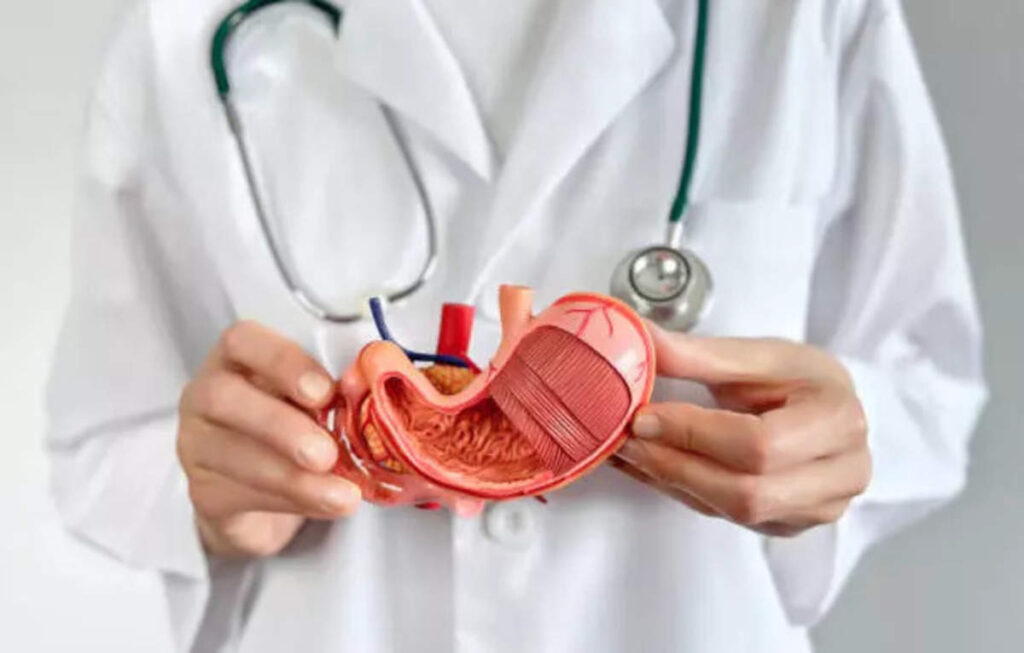Pediatrics
Our dedicated pediatric department focuses on providing comprehensive care for infants, children, and adolescents. From routine check-ups to specialized care, we prioritize the health and well-being of…
Introducing Dr. Arpit Bansal, a highly skilled Consultant Gastroenterologist, Hepatologist, and Physician currently practicing at Navjeevan Super Speciality Centre. Dr. Bansal brings a wealth of expertise to his role, having completed his MBBS from KMC Manipal in 2014, followed by an MD in Medicine from SRMS Medical College, Bareilly. His commitment to advancing his skills led him to achieve a prestigious DRNB in Gastroenterology from Max Superspeciality Hospital, Saket, New Delhi. With a holistic approach to gastrointestinal health, Dr. Arpit Bansal is dedicated to providing compassionate and comprehensive care to his patients.

Gastroenterology Services at Navjeevan Super Speciality Centre:
Discover comprehensive care for your digestive health with our specialized services:

Viral Hepatitis:
This includes Hepatitis A, B, and C, each caused by different viruses and requiring specific treatment approaches.
Fatty Liver Disease:
Characterized by excess fat accumulation in the liver, it can progress to more severe conditions if left unaddressed.
Cirrhosis:
This advanced stage of liver scarring can significantly impair liver function and requires specialized management.
Pancreatitis:
This inflammatory condition can be acute (sudden onset) or chronic (long-lasting) and cause severe abdominal pain.
Pancreatic Cancer:
This serious condition requires prompt diagnosis and specialized treatment, and early detection is crucial for improving outcomes.
Pancreatitis-Associated Diabetes Mellitus (PADM):
This type of diabetes can develop due to damage to the insulin-producing cells in the pancreas.
Pancreatic Cysts:
These fluid-filled sacs in the pancreas can be benign or malignant, requiring careful evaluation and appropriate management.
Acid Reflux and Heartburn:
This burning sensation in the chest occurs when stomach acid backs up into the esophagus.
Irritable Bowel Syndrome (IBS):
Characterized by abdominal pain, cramping, bloating, and irregular bowel movements.
Constipation:
Difficulty passing stools, often accompanied by straining and incomplete evacuation.
Lactose Intolerance:
Inability to digest lactose, a sugar found in milk and dairy products, leading to digestive discomfort.
Diarrhea:
Frequent loose stools that can lead to dehydration and electrolyte imbalance.
Inflammatory Bowel Disease (IBD):
Chronic conditions like Crohn’s disease and ulcerative colitis causing inflammation in the digestive tract.
Peptic Ulcers:
Open sores in the lining of the stomach or duodenum, often due to excess stomach acid or H. pylori infection.
Celiac Disease:
An autoimmune disorder triggered by gluten, causing damage to the small intestine.
Upper endoscopy:
Examines the esophagus, stomach, and duodenum (upper part of the small intestine).
Colonoscopy:
Evaluates the entire colon and rectum for polyps, cancer, and other abnormalities.
Sigmoidoscopy:
Focuses on the lower part of the colon and rectum.
Capsule endoscopy:
Uses a swallowable capsule with a camera to examine the small intestine.
Endoscopic retrograde cholangiopancreatography (ERCP):
Diagnoses and treats problems in the bile ducts and pancreas.
I’m grateful to Dr. Arpit Bansal at Navjeevan for the endoscopic treatment of my hemorrhoids.
I appreciate Dr. Arpit Bansal’s thorough approach in treating my digestive problems. The care I received has made a significant impact on managing and improving my condition
I’m grateful for Dr. Arpit’s expertise in managing my pancreatic issues. His thorough assessments and the treatment plan have been essential for my well-being.
A big thank you to Dr. Bansal at Navjeevan for suggesting a fibroscan. The liver health check was informative, and the interventions he prescribed made a noticeable difference.
If you consistently experience stomachaches, various factors such as dietary habits, stress, or underlying digestive issues may be contributing. It’s advisable to consult a gastroenterologist for a thorough assessment.
Persistent changes in bowel habits, especially if accompanied by other symptoms, should prompt a consultation with a gastroenterologist for a proper evaluation.
While occasional indigestion is normal, persistent symptoms like bloating, discomfort, or acid reflux may indicate a more serious problem, warranting evaluation by a gastroenterologist.
Gastroenterologists often recommend stress management techniques, dietary modifications, and regular exercise to help manage symptoms of IBS.
A gastroenterologist can provide personalized dietary advice to manage acid reflux, which may include avoiding trigger foods and adopting lifestyle modifications.
Consuming a balanced diet rich in fiber, staying hydrated, and avoiding excessive alcohol and processed foods can contribute to overall gut health.
Occasional bloating is common, but persistent or severe bloating may require evaluation by a gastroenterologist to rule out underlying issues.
Symptoms such as diarrhea, vomiting, abdominal pain, and fever could indicate a gastrointestinal infection, and it’s advisable to consult a gastroenterologist for appropriate treatment.
Our dedicated pediatric department focuses on providing comprehensive care for infants, children, and adolescents. From routine check-ups to specialized care, we prioritize the health and well-being of…
With a focus on digestive health, our gastroenterology services address a wide range of conditions affecting the gastrointestinal system. Our team of specialists is committed to accurate…
Our OB-GYN services cater to the unique healthcare needs of women, encompassing prenatal care, reproductive health, and gynecological services. We strive to support women through every stage…


At Navjeevan Super Speciality Centre, we believe in building trust and partnerships with our patients. We strive to create a healing environment where every individual feels heard, respected, and empowered to make informed decisions about their health.